The United States has a hypocritical history of publicly fighting for democracy and sovereignty while secretly undermining these very institutions in order to ensure their hegemonic power. The story of the U.S. overseeing coups and putting in capitalist and U.S. friendly dictators is not a new headline. History has repeated itself, and one of these cases is the 1973 coup in Chile. My paper below will examine United States’ involvement in Allende’s fall and the coup, human rights abuses of both Chilean and U.S. citizens, and how U.S. foreign policy has valued universal human rights.
Firstly, I want to share some beautiful photos that my father took in Chile in 1971 before the coup. My dad spent his 20's to his 40's traveling the world, hardcore backpacking style. In his 1970's Latin America trip he got by through hitch hiking in RV's, boats, and even small planes. He was a semi-professional photographer and after receiving a dual degree in psychology and philosophy he continued to pursue a degree in journalism, with photojournalism being his passion. I recently found his old slides and restored them to a digital format. I have throughly enjoyed this restoration project, as I get to sit around with my dad going through all of his old pictures and hearing his amazing travel stories. I want to share a few of them with you here, I hope you enjoy!
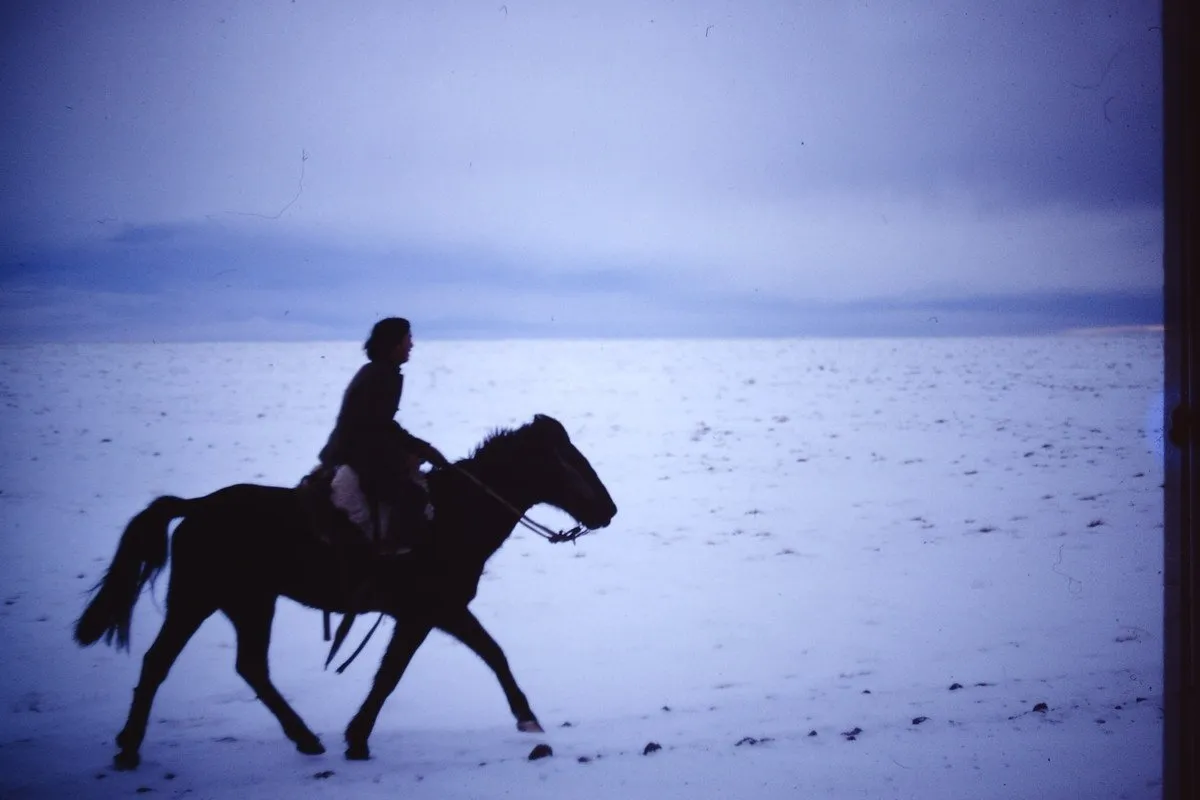
A man riding a horse on the way to Puerto Natales.
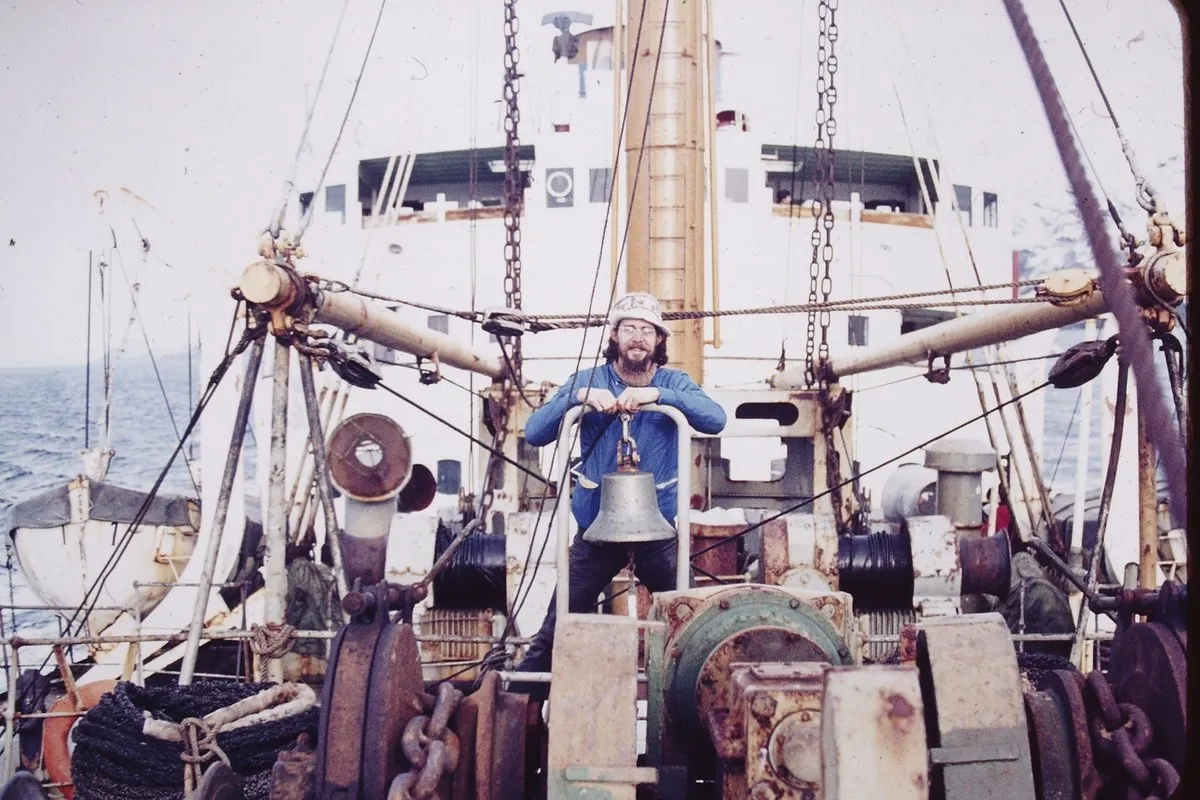
My dad hitchhiked on a little freighter from Punta Arenas to Puerto Montt. It had room for a few extra passengers and was a 4 day journey. They were served "slop", and each had a bunk on a wooden perch. It was freezing in Tierra del Fuego during June (Chile's winter), and they would stop and trade supplies with the small islands on the way.
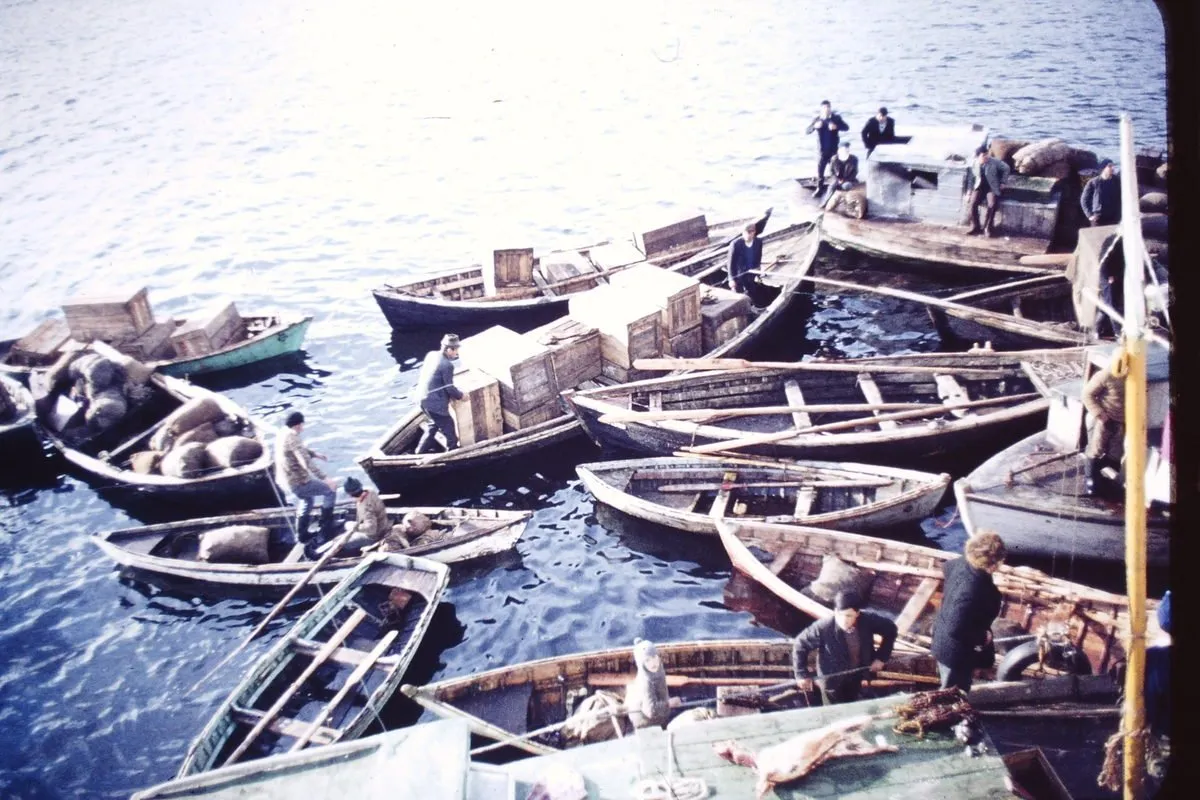
This picture was taken on the little freighter going through the icebergs and islands of the very south of Chile. One day smaller boats came up and the people in these boats started trading with the captain of the big boat. My dad found out that the people in these small boats were indigenous people of Patagonia who survived partially by trading their goods (furs, meat, ect) with goods from the commercial boats heading through the islands.
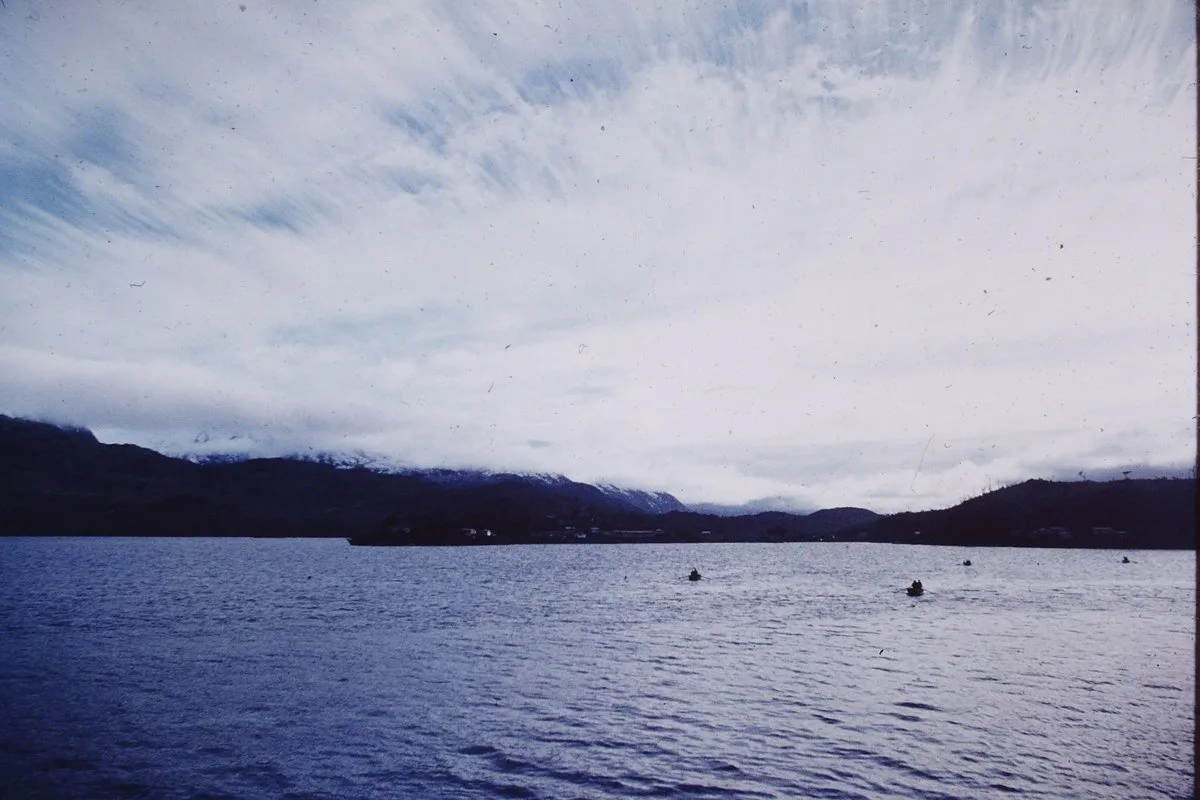
This was shot while passing through the Chilean Archipelago on the freighter. During the nighttime they didn’t go through because it was too dangerous to pass between the islands without visibility.
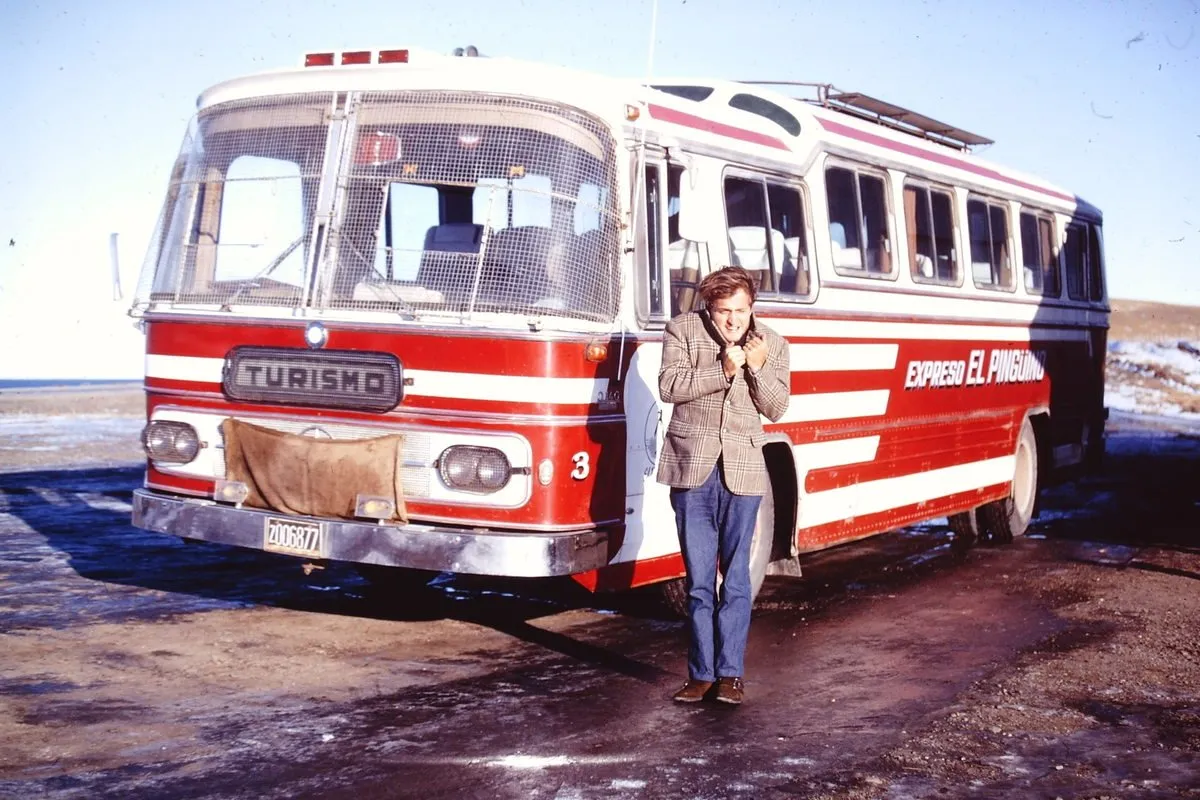
This shows an Austrian man that my dad met on the bus to Puerto Natales. They wanted to go to Torres del Paine but the roads were all closed during winter. Here, this bus is driving on a gravel dirt road covered in ice.
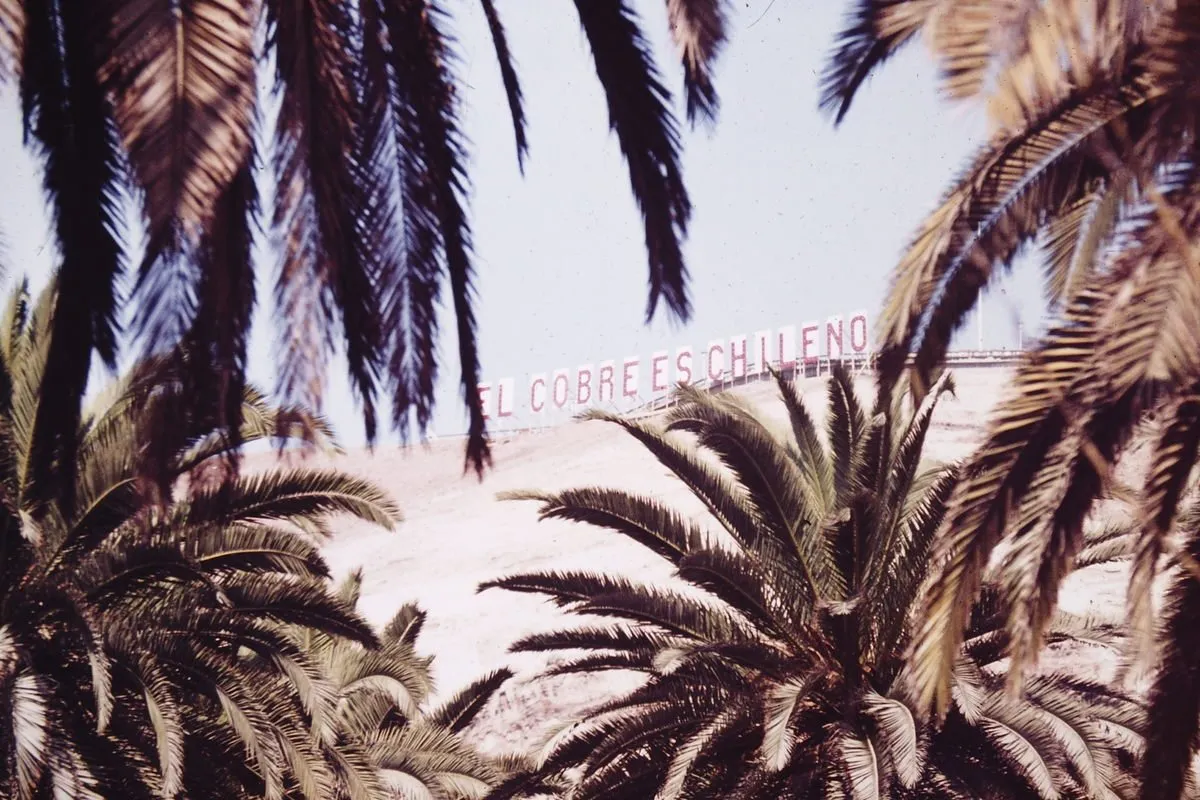
"El Cobre es Chileno" - This translates to "The Copper is Chilean". This was shot in Chile's Northern border town of Arica in 1971. President Allende had just nationalized the copper mines of Chile, most of which had previously been owned by U.S. companies. This triggered a huge U.S. backlash against Allende and was one of the main reasons that the CIA headed a coup against Allende in 1973.
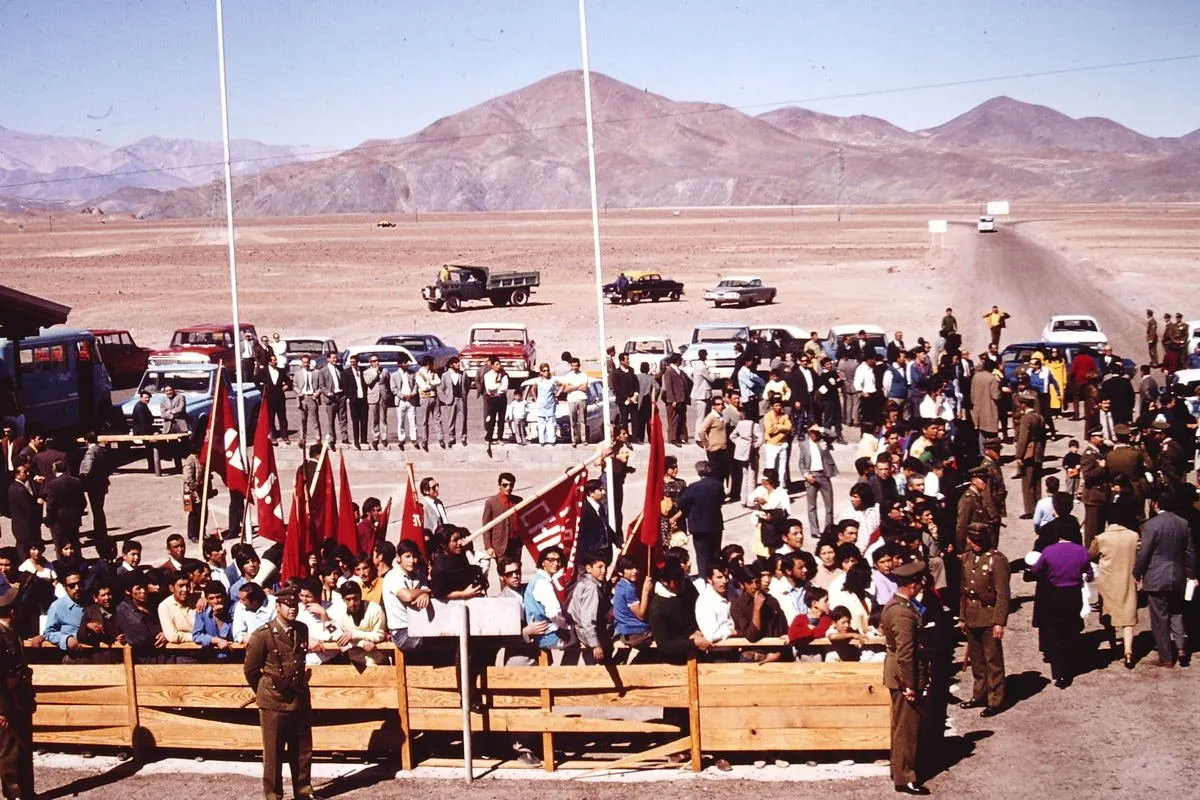
My dad was in a plane about to fly out of small copper mine city in northern Chile. Their flight was delayed because President Allende was just about to land to give a speech thanking the Chilean miners for their work.
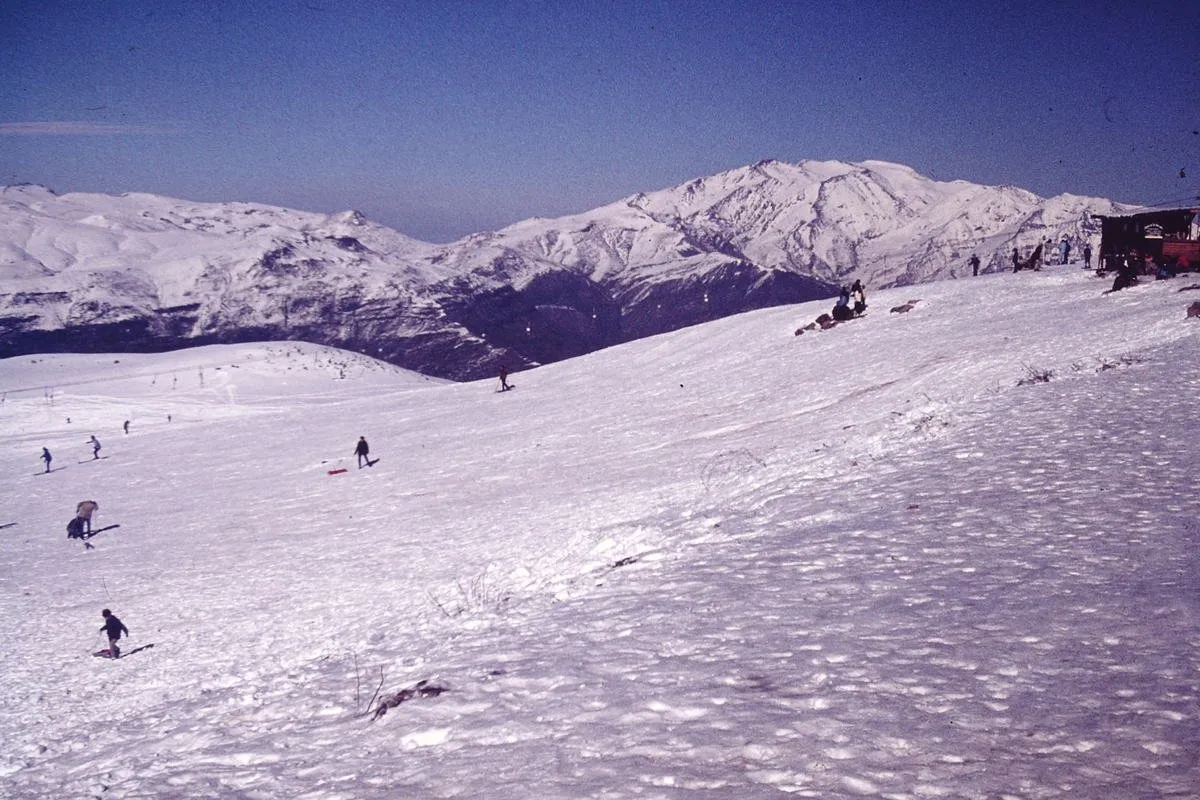
This is a ski resort right outside of Santiago. It is located in the Andes and is accessible by bus.
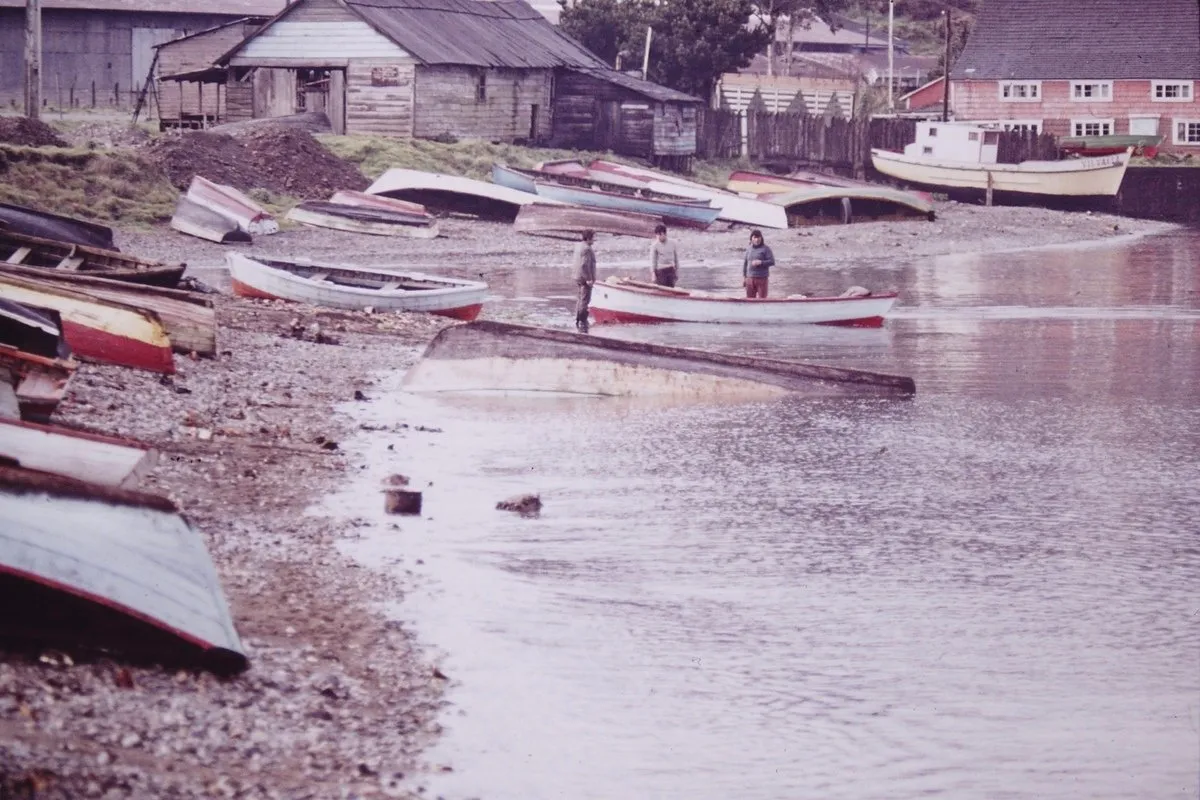
Puerto Natales pier - Puerto Natales is a small city in Southern Chile. It is most known as a jumping off point for Chile's most visited national park, Parque Nacional Torres Del Paine.
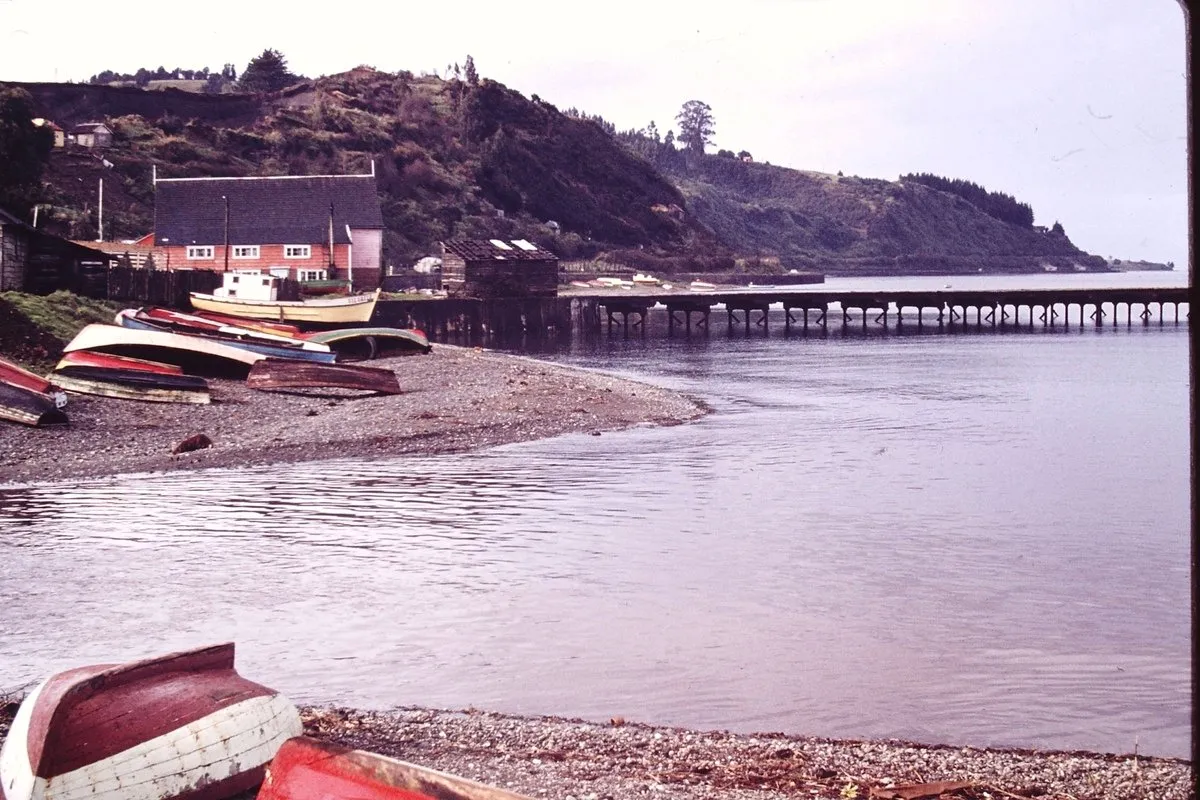
Puerto Natales pier - II
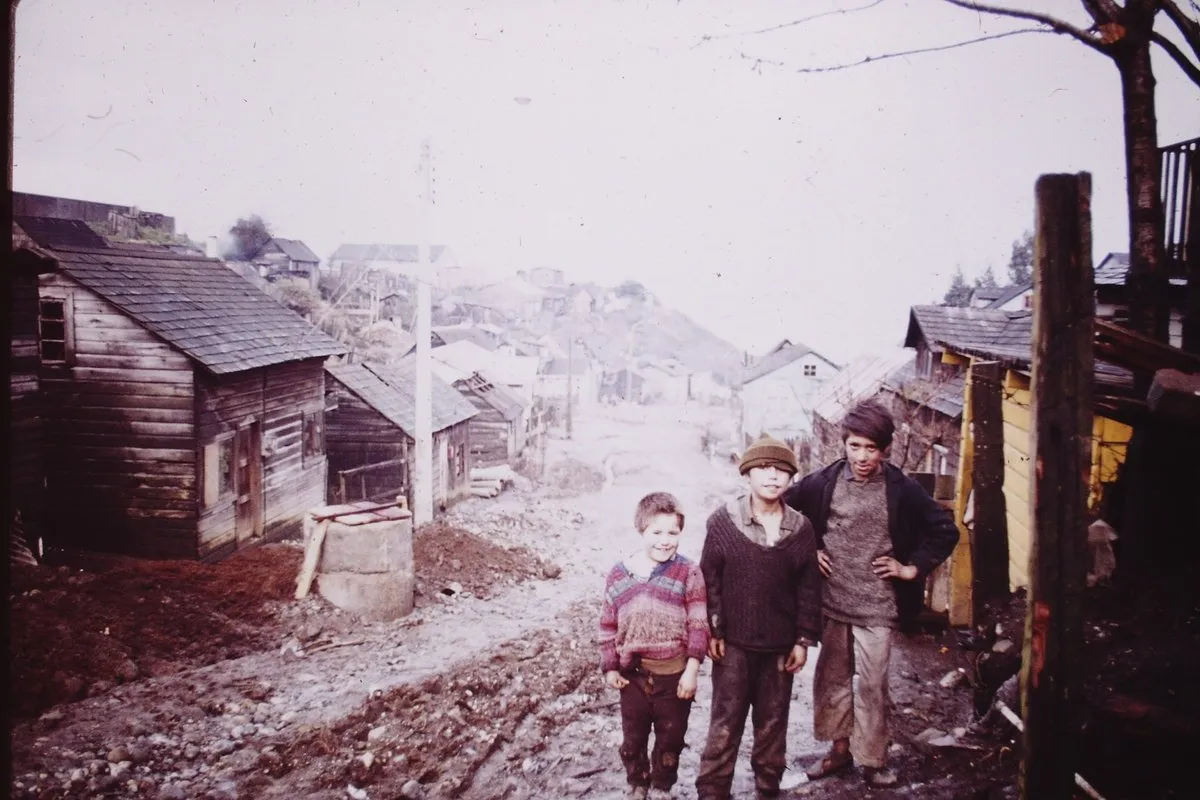
This shows children in the streets of Valparaiso a day after the big earthquake in 1971. My dad was flying from Santiago to Concon (a nearby city), and while he was in the airplane the earthquake occurred. He spent the next few days wandering the streets of Valparaiso looking at the destruction of the earthquake. It was so bad that caskets had come loose in cemeteries and slid down onto the streets.
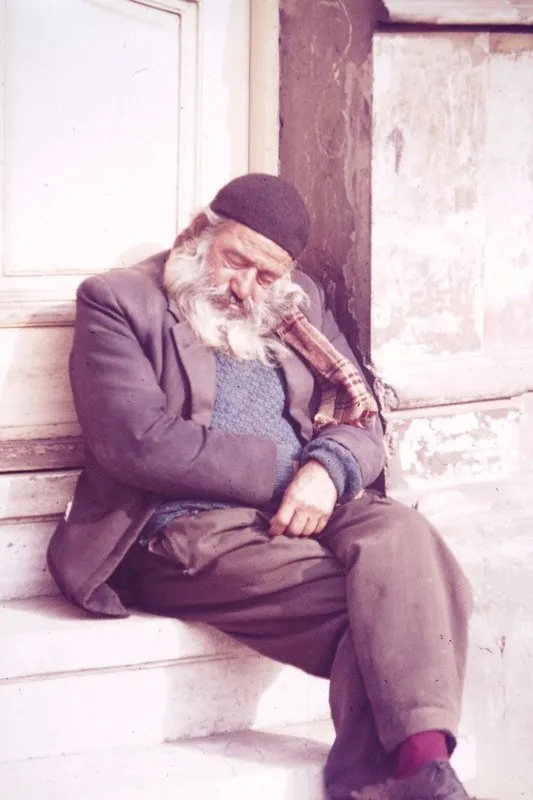
A portrait of a man in Santiago sitting outside of my dad's pension guest house.
The United States, 1973 Chilean Coup, and Human Rights Abuses
“The average person thinks that morality can be applied as directly to the conduct of states to each other as it can to human relations. That is not always the case, because sometimes statesmen have to choose among evils” - Henry Kissinger
The United States has a hypocritical history of publicly fighting for democracy and sovereignty while secretly undermining these very institutions in order to ensure their hegemonic power. The story of the U.S. overseeing coups and putting in capitalist and U.S. friendly dictators is not a new headline. History has repeated itself, and one of these cases is the 1973 coup in Chile. This paper will examine United States’ involvement in Allende’s fall and the coup, human rights abuses of both Chilean and U.S. citizens, and how U.S. foreign policy has valued universal human rights.
At the time of Allende’s rise to presidency he symbolized a direct conflict to the United States’ hegemonic power. President Nixon was worried that Allende would prove to be successful and demonstrate to the world that a socialist democracy is possible, while Secretary of State Kissinger was concerned that Chile would end up being another Cuba in terms of U.S. foreign policy (Kornbluh 2003: 80). Secretary of Defense Melvin Laird stated, “We have to do everything we can to hurt [Allende] and bring him down” (Kornbluh 2003: 79). The fall of Allende was a long term plan enacted by the entire U.S. government. The U.S. government executed many measures to weaken Allende’s presidency, but all of this was kept secret while Nixon publicly declared support for the Chilean government (Kornbluh 2003: 80). Kissinger and Nixon agreed that the operation had to be covert in order to avoid domestic and international resistance, especially since Allende was democratically elected (Kornbluh 2003: 81). Top secret directive from Kissinger to the CIA, State, Defense, the Joint Chiefs, and AID ordered a movement to “isolate, weaken, and destabilize Chile until the country was ungovernable” (Kornbluh 2003: 82). Nixon also ordered a huge attack on Chile’s economy, specifically by dumping U.S. copper shares in order to plummet the price of Chile’s main resource (Kornbluh 2003: 82). Two U.S. copper corporations owned 80% of Chile’s copper industry, and Allende sought to nationalize the copper industry which would have economically hurt the U.S. (Kornbluh 2003: 82). The story of why Allende was taken out of power by the Chilean military is often that he ran the economy into dust and the military stepped in to help the Chilean people out of poverty. However, the real story seems to be that the U.S. took drastic measures to see the Chilean economy falter. In fact, for the first few years of Allende’s rule, the Chilean economy and quality of life had improved. Further, the U.S. government claimed repeatedly that their involvement was due to the need to contain communist threats during the Cold War. However, very little is mentioned about the economic interests of U.S. companies in the Chilean copper industry. In order to put the U.S. in a good light, the conventional history of Allende’s fall seems to be written by the very hegemonic power who took him down.
The U.S. not only oversaw the economic downfall of Chile but also instigated and aided the military coup. The CIA undertook operations aimed at dividing the political atmosphere of Chile and created a strong domestic opposition against Allende. The military was a key player in the CIA’s operation. They began to recruit within the military and convince these recruiters that Allende was planning on overthrowing the army high command with the help of Castro (Kornbluh 2003: 94). This scare tactic backed many army officials in a corner, left to believe that if they did not overthrow Allende they would be left powerless. Without such covert tactics from the CIA, it is unclear whether or not such a strong anti-Allende sentiment would have existed in the military. A leak of documents in 1972 proved the U.S. desire for a military coup and in Chile “the revelations set off an explosion of nationalist indignation. The leaked documents bolstered a long-standing belief among the Chilean left of U.S. economic imperialism” (Kornbluh 2003: 97). The U.S. was not heroically coming into a country and freeing oppressed peoples, but rather secretly changing the fate of an entire country for the U.S’s own benefit. The Chilean people’s reaction to the leaked documents shows that many Chileans did not want a coup but rather wanted the U.S. to respect their sovereignty. For the coup, the understanding between the U.S. and Chilean military was that the military was to oversee the coup without U.S. intervention, however, Kissinger was ready to help the Chilean military if the coup did not go according to plan. This was not necessary as the military was able to swiftly overthrow Allende (Kornbluh 2003: 112). Though the military offered Allende a plane out of Chile to safety, Pinochet said in private “that plane will never land” and continued to say “kill the bitch and you eliminate the litter”, which foreshadowed the brutality of his regime (Kornbluh 2003: 113). Pinochet was handpicked by the CIA due to his desire for power, with zero regard for his lack of morality and violent nature. On September 11, 1973, the U.S. government succeeded in helping overthrow a democratically elected president and putting into power a dictator who would oversee thousands of human rights atrocities.
The United States government was responsible for Allende’s overthrow and the installation of a brutal dictatorship. Spearheading Chile’s fate was Henry Kissinger. The Secretary of State took a foreign policy that did not respect self-determination nor universal human rights. Richard Holbrooke, editor of Foreign Policy, said that Kissinger was “wholly free of any constraint based on a set of moral beliefs [and] without feeling of human suffering” and that he did not allow “human beings interfere with policy” (Johansen 1980: 240). Kissinger was responsible for secret bombings in Laos and Cambodia, was partially responsible for the Vietnam War, and oversaw covert operations in Bolivia, Uruguay, Chile, and Argentina (Grandin 2015). Kissinger also supported Operation Condor, which was a terrorist organization of the dictatorships of the Southern Cone that tortured and killed political dissidents. When U.S. ambassador to Chile, David H. Popper, attempted to discuss Chilean human rights abuses with Kissinger, Kissinger shot him down and refused to have the conversation (Johansen 1980: 240). Not only did Kissinger allow individual human rights abuses to occur under Pinochet’s regime, he also took away the Chilean people’s right to sovereignty by overthrowing a democratically elected president (Johansen 1980: 257). Many human rights activists push for Kissinger to be tried for war crimes, yet at the age of 93 he is still a venerated public figure in the United States (Grandin 2015). Pinochet, along with many other military officials, was tried for human rights abuses under the concept of universal jurisdiction. Kissinger was an appointed government official when he oversaw human rights abuses, and they were justified under the pretense of state security, however the question remains whether such an atrocious neglect of human rights can be justified under any situation. Whether or not Kissinger should be exempt from prosecution and universal jurisdiction is still contested by many human rights activists, however for now it seems as though Kissinger will remain protected from any legal action.
Though Kissinger worked directly against universal human rights, his actions ended up ironically advancing the human rights agenda. In her book “Reclaiming American Virtue” Barbara Keys argues that Kissinger was the person “most responsible for advancing the cause of international human rights in the mid-1970’s” (Keys 2014: 153) despite his desire to ignore human rights. Kissinger, in fact, actively prevented any of his staff from bettering the human rights situation in Chile (Keys 2014: 170). Liberals, once finding out about the U.S. involvement in Chile’s coup, were passionate about human rights abuses that occurred under Pinochet’s regime (Keys 2014: 153). Congress was also becoming fed up with Kissinger and his refusal to cooperate with them or address human rights abuses. From this resentment, activists were able to pass human rights measures that completely shifted the laws of American foreign diplomacy (Keys 2014: 155). This story shows that the advancement of human rights was not a rational, linear progression but rather a reactive movement. In this case, the reaction was fueled by Kissinger’s complete disregard for human rights in his foreign policy measures.
Not only did the U.S. government ensure that thousands of Chileans would be stripped of human rights, but the government also violated the rights of their own citizens. The American public was lied to by all top U.S. officials involved in the coup. The coup occurred without the knowledge of U.S. citizens. This can be argued as an abuse of powers, as democratically elected officials such as Nixon took power under the pretense of protecting U.S. citizen’s interests. Nixon and Kissinger exploited their power and lied to the public about U.S. involvement in Chile because they knew that the public would be against such actions. Additionally, in a globalized world where every country is interconnected, a regression of human rights in Chile affects the concept of human rights in the United States as well (Johansen 1980: 250). Further, the U.S. government spied on U.S. citizens living in Chile, and reported pro-Allende Americans to the Chilean military (Johansen 1980: 252). This exemplifies that the U.S. government was not acting for the betterment of their citizens but rather for more selfish reasons.
In the most extreme cases, the U.S. government even aided in the murders of their own citizens. Charles Horman was a 31-year-old journalist living in Chile during the coup, and reported on United State involvement. He was soon taken by Chilean soldiers and killed (Horman and Weiss 2013). U.S. State Department memo from 1973 states that “There is some circumstantial evidence to suggest US intelligence may have played an unfortunate part in Horman’s death. At best, it was limited to providing or confirming information that helped motivate his murder by the [government of Chile, or] GOC. At worst, US intelligence was aware that GOC saw Horman in a rather serious light and US officials did nothing to discourage the logical outcome of GOC paranoia” (Horman and Weiss 2013). International law obligates governments to protect their citizens and prevent them from being murdered overseas, which the U.S. government grossly failed to do (Horman and Weiss 2013). The Horman family filed criminal suits against Pinochet and Kissinger for the death of Charles Horman. The cases were dismissed because they could not provide evidence of Kissinger’s wrongdoing due to all of the information being classified (Horman and Weiss 2013).
Foreign policy during the Nixon administration valued U.S. economic interests, hegemonic power, and a world capitalist system well over human rights. In his book “The National Interest and the Human Interest” Robert Johnson argues that “the Chilean case shows that the most highly respected U.S. officials of both political parties consistently deceived their own constituents about their own human rights policies. They lied not to protect U.S. security, as the eventually claimed, but to disguise the true intent and value impact of their actions” (Johansen 1980: 260). This is a history of the U.S. government protecting U.S. corporate economic interests at the cost of hundreds of thousands of human rights abuses of both Chilean and U.S. citizens. Such cooperations included ITT, Anaconda, and Kennecott, which were U.S. information technology and copper cooperations based in Chile (Johansen 1980: 261). The more private and secret U.S. government operations in Chile were, the less concern for human rights were exhibited (Johansen 1980: 261). This suggests that one of the best assurances for human rights is transparency between the government and citizens. Further, the CIA was given too much power with very little checks and balances from Congress. The CIA was controlled by officials who valued actions directly opposed to human rights (Johansen 1980: 266). The U.S. government repeatedly justified their involvement in the coup as freeing Chileans and ensuring democracy, however Chile was already a democracy. In fact, the U.S. government did not succeed in ensuring Chilean democracy but rather succeeded in ensuring a dictatorship and the imprisonment of thousands.
The full truth of foreign policy motives is seldom revealed, as they are rarely for noble causes that would be supported by the public. The truth behind the 1973 Chilean coup only surfaced after the public had any power to change the outcomes. The U.S.-Chilean case shows a common conflict between economic interests and the protection of universal human rights. The extreme nature by which Kissinger ignored human rights also provided an environment to fight for and advance how human rights are dealt with in foreign policy. The hope of human rights activists and millions of citizens of the world is that, in this case, history will not continue to repeat itself.
Grandin, Greg. Interviewed by Goodman, Amy. 2015. With a Record Backing Coups, Secret War & Genocide, Is Kissinger an Elder Statesman or War Criminal?. Democracy Now.
Horman, Joyce and Weiss, Peter. Interviewed by Goodman, Amy. 2013. Was U.S. Journalist Charles Horman Killed by Chile’s Coup Regime with Aid of His Own Government? Democracy Now.
Johansen, Robert C. 1980. “The National Interest and the Human Interest”. Princeton University Press.
Keys, Barbara. 2014. “Reclaiming American Virtue”. Harvard University Press.
Kornbluh, Peter. 2003. “The Pinochet File”. The New Press.